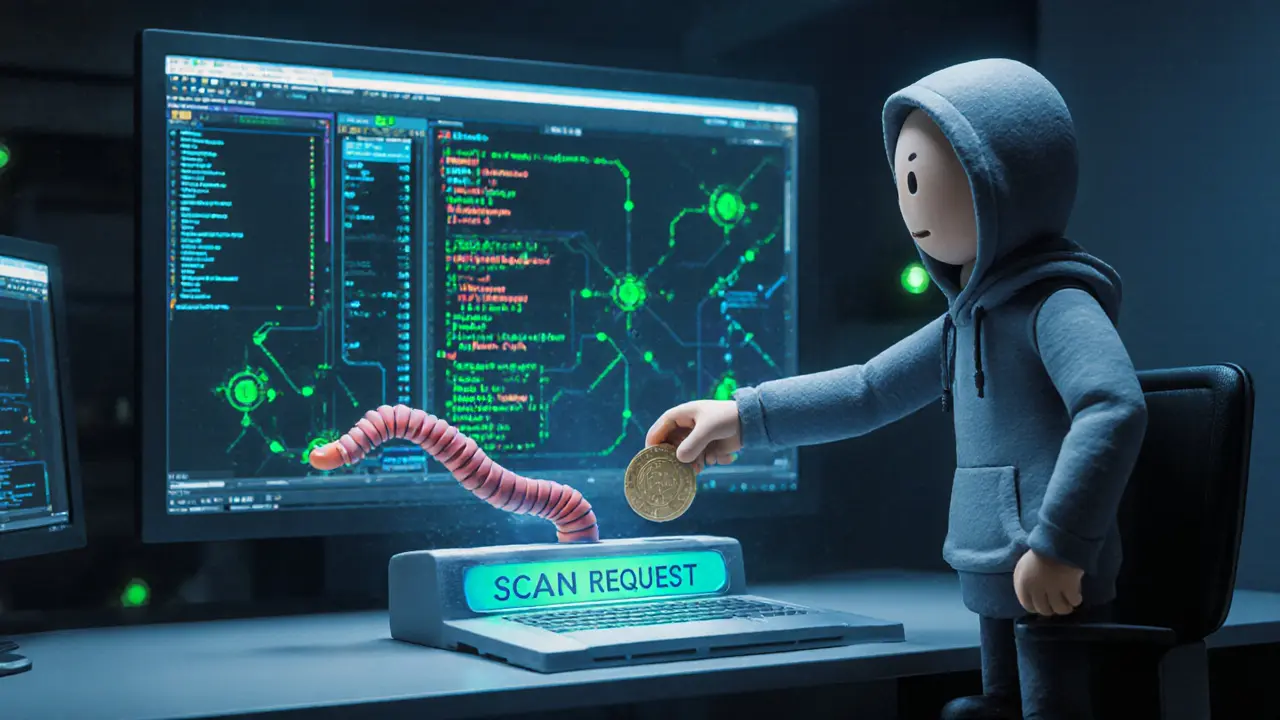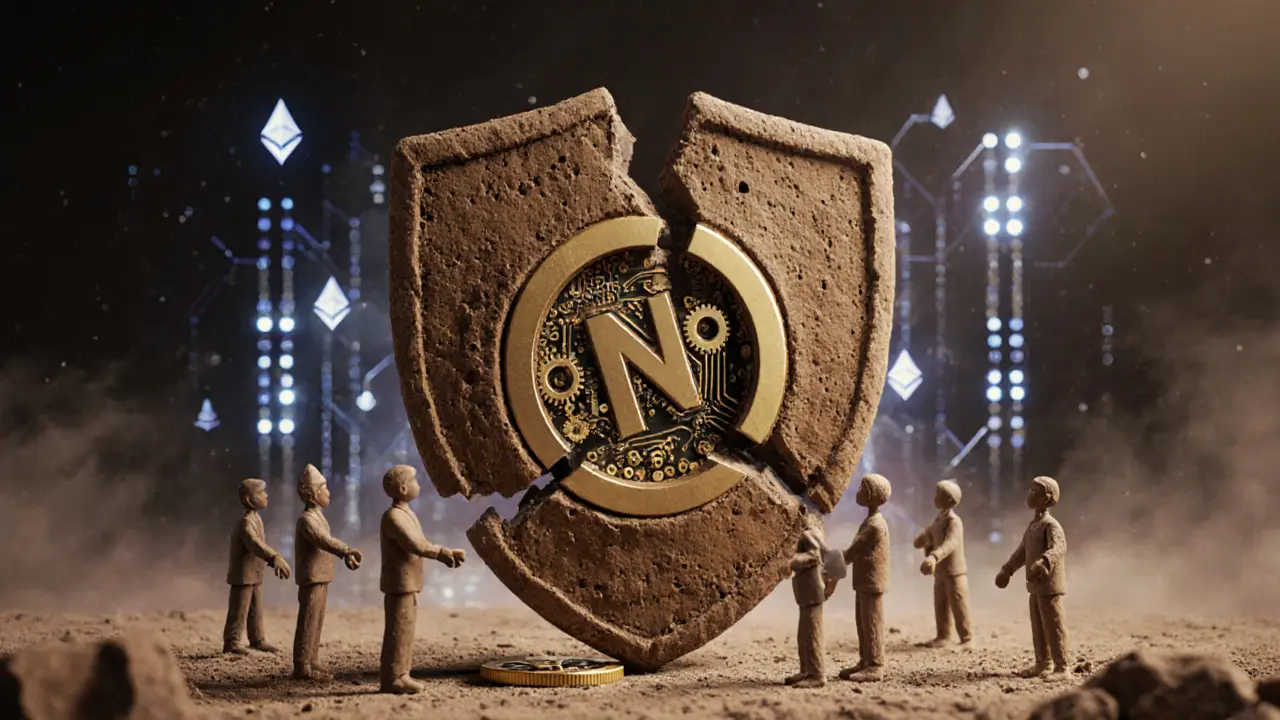What is PolySwarm (NCT) Crypto Coin? A Practical Guide to the Cybersecurity Threat Intelligence Token
 Jan, 30 2025
Jan, 30 2025
PolySwarm Earnings Calculator
How Much Could You Earn?
Calculate your potential NCT earnings as a security expert on the PolySwarm platform based on detection performance.
Results
Note: Current NCT price is $0.01063. These estimates assume you're participating in active bounties with consistent detection rates.
Typical earnings range from $100-$5,000 monthly for active experts. Your income depends on:
- Accuracy rate (higher accuracy = higher rewards)
- Speed of detection (faster = higher rewards)
- Uniqueness of your detection methods
Most cryptocurrencies are built for speculation, DeFi, or NFTs. But PolySwarm is different. It’s not just another coin. It’s a working tool used by real cybersecurity experts to catch malware before it spreads. If you’ve ever wondered how a crypto token can actually solve a real-world problem, PolySwarm (NCT) is one of the few that delivers.
What Exactly Is PolySwarm?
PolySwarm is a decentralized marketplace where security researchers compete to find and analyze malware. Instead of relying on one company’s antivirus engine, it brings together thousands of independent experts - called ‘micro-engines’ - who submit their own detection methods. The best ones get paid in NCT, the platform’s native token.
Think of it like a bug bounty program, but for malware. If a hacker creates a new ransomware strain, PolySwarm puts out a bounty. Security experts race to detect it. The first to accurately identify it, with proof, earns NCT. The system uses blockchain to verify results so no one can cheat.
This isn’t theory. Companies like Fortune 500 enterprises use PolySwarm to detect zero-day threats that traditional antivirus software misses. Why? Because no single company can keep up with every new variant. But thousands of global researchers? They can.
What Is NCT (Nectar) and How Does It Work?
NCT, or Nectar, is the token that powers the entire PolySwarm system. It’s an ERC-20 token built on Ethereum, meaning it uses Ethereum’s network for transactions and security. There’s no mining. All 1,885,913,076 NCT tokens were created at launch in March 2018, and none are left to be mined.
Here’s how NCT moves through the system:
- Enterprises pay in NCT to submit malware samples for analysis.
- Security experts earn NCT when their detection engines correctly identify threats.
- Those who consistently perform well get higher rewards and priority access to new bounties.
- NCT is also used to access premium features like PolyScore (automated threat scoring) and private threat feeds.
The token isn’t meant to be hoarded. It’s a utility token - you need it to participate. That’s why its value isn’t driven purely by hype. It’s tied to real demand from cybersecurity teams.
How PolySwarm Beats Traditional Antivirus
Traditional antivirus companies like CrowdStrike or Symantec rely on their own internal teams. They update signatures weekly or monthly. But malware evolves daily. By the time a signature is released, the threat may already be spreading.
PolySwarm flips that model. Instead of waiting for one company to catch up, it crowdsources detection. Hundreds of researchers are analyzing the same sample at the same time - each using their own tools, techniques, and data sets. One might spot a hidden behavior. Another might recognize a new obfuscation pattern. Together, they cover gaps no single vendor can.
According to PolySwarm’s own case studies, their system detects 30-40% more unique malware samples than top commercial engines. That’s not a small edge - it’s the difference between a breach and a near-miss.

Who Uses PolySwarm and Why?
There are two main users:
- Security Professionals - These are the micro-engine developers. They’re often former red-team members, malware analysts, or independent researchers. Some work for firms, others freelance. They use PolySwarm to monetize their skills. One expert told a developer forum they earned over $8,000 in NCT in six months just by submitting accurate detections.
- Enterprise Security Teams - Companies with high-risk infrastructure (banks, healthcare, cloud providers) use PolySwarm as a supplement to their existing tools. They pay in NCT to scan suspicious files and get real-time alerts. Some integrate PolySwarm directly into their SOC (Security Operations Center) workflows using APIs.
It’s not for everyone. If you’re a small business running basic antivirus, you don’t need PolySwarm. But if you’re defending against advanced persistent threats, ransomware campaigns, or targeted attacks - it’s a powerful layer.
Market Data and Token Performance (As of November 2025)
As of November 26, 2025, here’s the current state of NCT:
- Price: $0.01063 USD
- Market Cap: $20.19 million
- 24-Hour Volume: $356,180 USD
- Token Supply: 1,885,913,076 NCT (fixed, no inflation)
- Token Holders: 8,870 unique wallets
Compared to Bitcoin or Ethereum, NCT is tiny. But that’s not the point. Its value isn’t in market cap - it’s in utility. The trading volume is low because most NCT is held by active users, not speculators. You won’t see wild pumps here. You’ll see steady usage.
Over the past month, NCT dropped about 35%. That’s partly due to broader crypto market weakness. But it’s also because the platform hasn’t announced major new enterprise deals lately. Still, PolySwarm has been operational since 2018. It’s not a vaporware project. It’s quietly running, serving clients, and improving its detection engines.

How to Get NCT and Start Using PolySwarm
You can buy NCT on major exchanges that support ERC-20 tokens:
- Bitget
- Gate.io
- KuCoin
- Uniswap (via Ethereum wallet)
To use the platform:
- Get an Ethereum wallet (MetaMask is easiest).
- Buy ETH and swap it for NCT on Uniswap, or buy NCT directly on an exchange and withdraw to your wallet.
- Visit polyswarm.network and sign up.
- Enterprises can request a free trial to test the threat detection API.
- Security experts can download the PolySwarm SDK to build and deploy their own micro-engines.
The learning curve isn’t steep for buyers. But if you want to build detection engines, you’ll need to understand malware analysis, YARA rules, and basic blockchain interaction. PolySwarm provides documentation, sample code, and community forums to help.
Challenges and Risks
PolySwarm isn’t perfect. Here are the real issues:
- Ethereum Fees: Every transaction costs gas. If Ethereum gets congested, using PolySwarm becomes expensive.
- Adoption Gap: Most companies still use traditional SIEM and EDR tools. Convincing them to add a crypto-based layer takes time.
- Price Volatility: NCT’s value can swing with crypto sentiment, even if usage stays steady. That makes long-term planning harder for enterprises.
- Competition: Platforms like Immunefi and Hivemapper are also trying to bridge blockchain and security. PolySwarm is first, but not alone.
Still, no other project has been running this model for over seven years. That’s a track record most crypto projects can’t claim.
Why PolySwarm Matters
Cyberattacks cost the global economy over $8 trillion in 2024. Ransomware is growing. Zero-days are more common. Traditional defenses are falling behind.
PolySwarm proves that blockchain isn’t just for finance. It can be used to align incentives in real, high-stakes industries. It turns cybersecurity from a closed, proprietary game into an open, collaborative one.
NCT isn’t a get-rich-quick coin. It’s a tool. And tools have value when they work. If you’re in cybersecurity, you should know about PolySwarm. If you’re in crypto, you should know about the projects that do more than move money - they move security forward.
Is PolySwarm (NCT) a good investment?
NCT isn’t designed as a speculative asset. Its value comes from usage, not hype. If you believe in decentralized cybersecurity and think more enterprises will adopt it, holding NCT could make sense. But don’t buy it expecting quick price gains. The market cap is small, volume is low, and it’s subject to crypto-wide volatility. Only invest what you’re comfortable losing.
Can I mine NCT tokens?
No, you cannot mine NCT. All tokens were created at launch in 2018. The supply is fixed at 1.88 billion. New tokens aren’t minted. Rewards for security experts come from existing NCT held in the platform’s reward pool.
How do security experts earn NCT on PolySwarm?
Experts submit malware detection engines (called micro-engines) to analyze threats posted as bounties. When their engine correctly identifies a threat - and other engines confirm it - they earn NCT. Accuracy, speed, and uniqueness determine payout size. The blockchain verifies results, so no one can fake their performance.
Is PolySwarm only for experts?
No. Anyone can buy NCT and use it to scan files through the PolySwarm platform. Enterprises can integrate it into their security systems. But to build detection engines and earn rewards, you need technical skills in malware analysis, programming, and blockchain tools. It’s not a beginner-friendly tool for earning crypto - it’s a professional tool for improving cybersecurity.
What makes PolySwarm different from other crypto projects?
PolySwarm is one of the few crypto projects with real, measurable utility outside of finance. It’s not a meme coin, a DeFi yield farm, or an NFT collection. It’s a working platform used by cybersecurity teams to detect malware. Its token, NCT, has a direct, functional role in the system. That’s rare - and valuable.
Savan Prajapati
November 27, 2025 AT 09:49This isn't crypto, it's just a fancy bug bounty with tokens. Why pay in NCT when you can just use regular money? 🤷♂️
Michael Labelle
November 28, 2025 AT 14:47Actually, this is one of the few crypto projects I’ve seen that doesn’t feel like a scam. The fact that it’s been running since 2018 and actually helps companies detect zero-days? That’s rare. I’ve seen too many ‘revolutionary’ tokens vanish after a year.
Vance Ashby
November 29, 2025 AT 16:44Yeah but gas fees on Ethereum are a nightmare for micro-engines. One scan = $5 in gas? That’s not sustainable unless you’re already rich. 😅
Brian Bernfeld
November 30, 2025 AT 10:02Guys, let’s not sleep on this. I’ve worked in SOC teams for 12 years. Traditional AV misses 30-40% of new malware? That’s not a number - that’s a death sentence waiting to happen. PolySwarm isn’t just cool tech - it’s a lifeline. I’ve seen it stop ransomware in real time. NCT isn’t a coin, it’s a security protocol. And yes, Ethereum fees suck, but Layer 2s are coming. This is the future, not a gimmick.
Casey Meehan
December 1, 2025 AT 14:2530-40% more detections? That’s insane. 😱 I thought AI was the future of malware detection… but this is like a hive mind of hacker geniuses. NCT might be the only crypto token I’d actually hold. 💪
Tom MacDermott
December 2, 2025 AT 19:07Oh wow, another ‘real-world use case’ crypto. Next they’ll tell us blockchain is used to track avocado shipments. 🤭 This is just a glorified freelance platform with a token that’s worth less than your coffee. If it’s so great, why isn’t CrowdStrike using it? Oh right - because it’s irrelevant.
Martin Doyle
December 4, 2025 AT 09:22Tom, you’re missing the point. This isn’t about replacing CrowdStrike - it’s about filling the gaps they ignore. I’ve seen PolySwarm catch what their EDR missed. It’s not hype, it’s a safety net. And if you think $0.01 is worthless, try earning $8k in 6 months with it. Then come back.
Susan Dugan
December 6, 2025 AT 01:40Okay, I’m a total crypto newbie but I love this. I work in healthcare IT and we get hit with ransomware every few months. If this thing can catch stuff our $100k antivirus misses? Sign me up. I don’t care if it’s on blockchain - if it works, it’s magic. And the fact that real people are getting paid to stop hackers? That’s the kind of crypto I can get behind. 🙌
Sam Daily
December 6, 2025 AT 07:21Look, I used to think crypto was all gambling. Then I saw a malware analyst friend of mine go from $200/month side hustle to $8k/month using PolySwarm. He’s not a genius - he just knows how to write YARA rules. This isn’t about speculation. It’s about rewarding skill. And honestly? The fact that this has survived 7 years in crypto hell? That’s the real story. Most projects die in 6 months. This one? It’s quietly saving companies. That’s worth more than any pump.